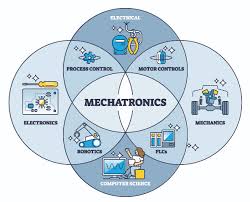Mechatronics is a multidisciplinary field of engineering that combines elements of mechanical engineering, electrical engineering, control engineering, and computer science. It focuses on the design, development, and operation of systems that integrate mechanical, electrical, and electronic components.
Key Concepts in Mechatronics
- Electromechanical Systems: Mechatronics systems often involve the interaction between electrical and mechanical components, such as motors, sensors, and actuators.
- Control Systems: Mechatronics systems typically incorporate control systems to regulate their behavior and achieve desired outcomes.
- Microcontrollers and Microprocessors: These electronic components are essential for processing information and controlling the system.
- Sensors: Mechatronics systems often rely on sensors to gather information about their environment and feedback to the control system.
- Actuators: Actuators are devices that convert electrical or other forms of energy into mechanical motion.
Applications of Mechatronics
Mechatronics has a wide range of applications across various industries, including:
- Robotics: Mechatronics is essential for designing and building robots that can perform tasks autonomously or with human guidance.
- Automation: Mechatronics systems are used to automate manufacturing processes, improve efficiency, and reduce costs.
- Automotive: Mechatronics is integral to the design and operation of modern vehicles, including engine control systems, anti-lock brakes, and driver assistance features.
- Medical Devices: Mechatronics is used in the development of medical devices, such as prosthetic limbs, surgical robots, and diagnostic equipment.
- Consumer Electronics: Mechatronics plays a role in the design and manufacturing of consumer products, such as smartphones, cameras, and gaming consoles.
Challenges and Future Directions
Mechatronics is a rapidly evolving field with several challenges and opportunities:
- Complexity: Mechatronics systems can be complex, requiring a deep understanding of multiple engineering disciplines.
- Integration: Integrating mechanical, electrical, and electronic components seamlessly can be challenging.
- Miniaturization: The trend towards smaller and more compact mechatronic systems presents design and manufacturing challenges.
- Sustainability: Designing mechatronic systems that are energy-efficient and environmentally friendly is a growing priority.
- Advancements in Technology: Advances in areas such as artificial intelligence, machine learning, and nanotechnology will continue to drive innovation in mechatronics.
As technology continues to advance, we can expect mechatronics to play an even more significant role in shaping our world.
